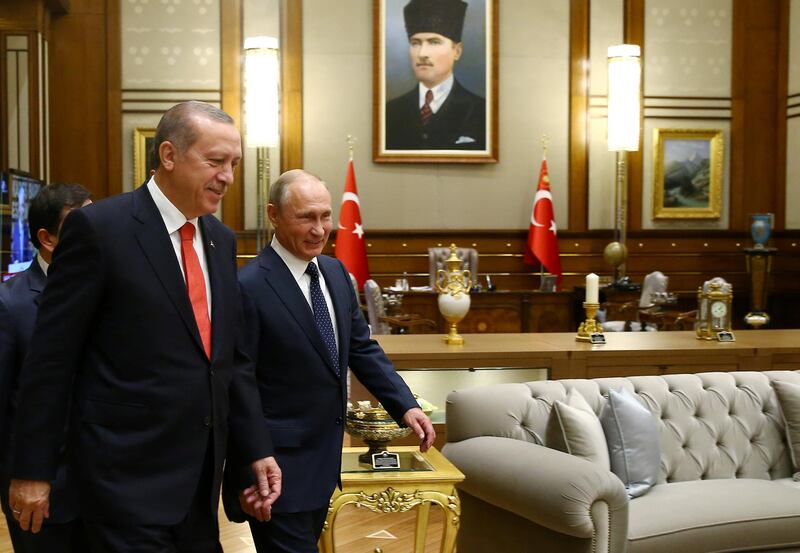Russian President Vladimir Putin and Turkish counterpart Recep Tayyip Erdogan on Thursday agreed to push for the creation of a "de-escalation" zone in Syria's key northern province of Idlib to help end the civil war.
Mr Erdogan said after talks in Ankara that the pair agreed to "pursue more intensely" the implementation of a de-escalation zone in Idlib, which is currently under jihadist control, in comments echoed by Mr Putin.
Moscow and Ankara have proposed at peace talks in the Kazakh capital Astana the creation of four de-escalation zones in Syria to be patrolled by military observers, but the one in Idlib is by far the most significant.
Mr Putin said Russia and Turkey would work to "deepen coordination" on ending the over six-year civil war, adding the right conditions now existed for the conflict to end.
"De-facto, the necessary conditions have been created for the end of the fratricidal war in Syria, the final defeat of terrorists and the return of Syrians to a peaceful life and their homes," said Mr Putin.
Russia and Turkey would work "with the aim of deepening the coordination of our joint activity to solve the Syria crisis," he added.
___________________
Read more:
Erdogan to discuss 'sanctions' against Iraq's Kurdish region
Russia, Iran and Turkey to share monitoring of Idlib safe zone in Syria
___________________
The Russian leader said the work to implement the agreements made at the Astana peace talks has "not been easy" but the sides had already "succeeded in having a positive result".
Mr Erdogan said that the two sides had reaffirmed their determination to work closely and show a "joint will" to end the Syria conflict.
Turkey and Russia have been on opposing sides during the more than six years of war in Syria, with Russia the key backer of President Bashar Al Assad and Turkey supporting rebels seeking his ousting.
But Ankara and Moscow have been working closely since a 2016 reconciliation ended a crisis caused by the shooting down of a Russian war plane over Syria.
"Russia and Turkey are cooperating very tightly," Mr Putin's spokesman Dmitry Peskov said ahead of the one-day working visit by Mr Putin to Ankara.
With Moscow's ally Mr Assad now having the upper hand in the conflict, Russia will be hoping Turkey will bring the rebels it has supported into the political process.
Turkey, a Nato member, has signed a deal reportedly worth $2 billion (Dh7.35bn) to buy S-400 air defence systems from Russia, a move that has shocked its allies in the alliance.
Economic cooperation is also beginning to flourish, with Russian tourists returning to Turkey and the two countries working on a Black Sea gas pipeline.
Yet analysts say that while both countries share an interest in seeking to discomfort the West by showing off close cooperation, their relationship falls well short of a sincere strategic alliance.
"Relations between Turkey and Russia may appear to be friendly, but they are loaded with contradictions and set to remain unstable in the near term," Pavel Baev and Kemal Kirisci of the Brookings Institution wrote in a study this month.
Russia's stance on the non-binding Kurdish independence vote is also troubling for Turkey, for whom opposing Kurdish statehood is a cornerstone of foreign policy due to its own Kurdish minority.
_______________
Read more:
92% of Kurdish voters choose independence from Iraq
Exclusive: Iraq paying price today for past mistakes says vice-president
_______________
The Russian foreign ministry said on Wednesday that while Moscow supports the territorial integrity of Iraq, it "views the Kurds' national aspirations with respect".
"Russia has been trying to abstain from taking a clear stance on the issue and Turkey may be wanting to get some assurances and explanations," Timur Akhmetov, Ankara-based Turkey expert at the Russian International Affairs Council, said.
In public, Mr Erdogan has shied away from attacking Russia's stance on the Kurdish referendum, declaring that Israel was the only state that backed the poll.
However, he continues to insist that the Iraqi Kurdish independence referendum has no legitimacy.
In a statement after the talks with Mr Putin on Thursday, Mr Erdogan said the Kurdish Regional Government in northern Iraq must be prevented from making "bigger mistakes".
Deliveries of the S-400s, meanwhile, could be years away due to orders from China, while Ankara's insistence on a technology transfer as part of the deal may also create problems.
But both Moscow and Ankara are, for now, happy to send a message to the West that they are serious about defence cooperation.
"They are trying to utilise the issue of the S-400 for their respective political interests," Mr Akhmetov said.






